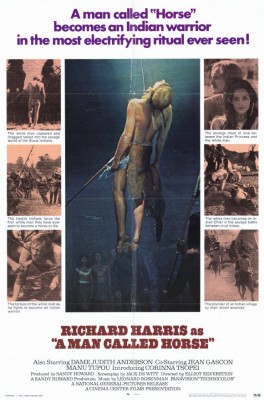By Stuart Galbraith IV
Morgan is taken alive and made sport of by his captors. The leader of the tribe, Chief Yellow Hand (Manu Tupou, actually Fijian), declares Morgan a "horse" and treats him like one, leading him around on a kind of leash. Morgan is made a slave of Yellow Hand's crotchety mother, Buffalo Cow Head (Judith Anderson), and the white man bides his time, hoping for a chance to escape his captors. He learns more about the tribe from its only other Caucasian (and only other white character in the film), Batise (Jean Gascon), a French-immigrant who, five years into his captivity and after being deliberately hamstrung after trying to escape, has become its fool.
The film compares unfavorably to Arthur Penn's outstanding Little Big Man, released later that same year. They operate from the same premise, of a white man captured by Indians, who in both films is initially terrified but who gradually comes to respect and even admire his captors. (There are several other plot points nearly identical that I won't spoil here.) Stylistically the films are miles apart, however, with Little Big Man singularly picaresque, mixing satire with tragedy while drawing parallels between the genocide of the American Indian and the war in Vietnam, particularly the My Lai Massacre. It's still one of the five or six best Westerns ever made.
By contrast, A Man Called Horse is nearly humorless, uneasily mixing apparently authentic Sioux traditions with pseudo-mysticism, drawing obvious parallels between Morgan's search for meaning in his unhappy life ("I'm looking," he says at the beginning of the picture, "Just looking") with similarly dissatisfied late-'60s youth.
The medicine man supervising this ritual is played by actor Iron Eyes Cody, symbolizing the film's alternately authentic / phony air. Cody was for years one of the most instantly recognizable Native American actors, best known for a famous series of "Keep America Beautiful" public service announcements. Only problem was Cody was actually the son of Sicilian immigrants and born Espera Oscar de Corti, though Cody's wife was an Indian, as were their adopted children, and Cody himself was a tireless advocate of Indian causes. (And, to be fair, back in 1970 Cody's real roots would have been unknown to the filmmakers, not that it would have mattered.)
This mix of the authentic and inauthentic seriously damages the film, though by 1970 standards only real Indians and historians recognized its inaccuracies. Judith Anderson (wearing black contact lenses) is believable as the crusty, crabby Buffalo Cow Head, but Harris's love interest, Running Deer (Greek actress Corinna Tsopei) looks ridiculous, like Ann-Margret in a black wig.
The film's emphasis on grisly ritual--versus the wisdom expressed by Old Lodge Skins, played by Chief Dan George, throughout Little Big Man--make its supposed respect for Indian culture at least appear slightly disingenuous. Further, the idea of a white man winning over his captors and (mild spoilers) rising to great heights within the tribe is pure fantasy, a backhandedly arrogant and imperialist notion perpetuated to the present day in movies like Dances with Wolves (1990) and The Last Samurai (2003). Little Big Man, for all its tall tales, is much more realistic; Jack Crabb (Dustin Hoffman) is accepted into his tribe (his being captured in childhood helps), but he's always regarded as an adopted outsider and never fully embraced or truly accepted by Indians and, later, whites alike.


1 comment:
I think if I ever go to porn, I'll call my first movie "A Horse Called Man". I'll play Shames His Horses.
More seriously, of course, the really bad thing is, they clearly knew nothing about the Sun Dance. As is notable by the fact that they did it indoors. Please let a LITTLE COMMON SENSE be used?
Post a Comment